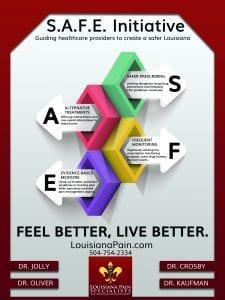
Chronic pain can be debilitating for many people suffering from back pain, neck pain, and other serious pain. Pain relief pills have benefited some patients, but have also led to an opioid epidemic of pain pill abuse. Many healthcare providers are less willing to prescribe large doses of prescription painkillers, and are now using other approaches to help their patients manage their chronic pain.
The S.A.F.E. Initiative

Dr. Suneil (Neil) Jolly started the S.A.F.E. initiative to try to limit opioid use and abuse. The S.A.F.E. initiative is one component to battling the opioid epidemic. The S stands for safer prescribing which means limiting how opioids are prescribed. A is for alternative treatment options. This includes, but is not limited to, various alternatives to oral opioids such topical agents and creams. F stands for frequent monitoring. “This part often gets overlooked,” according to Dr. Suneil (Neil) Jolly. Monitoring is important to let doctors know what, or if, patents are taking the proper medications. It also provides means to find potential culprits in the opioid epidemic in our communities. Finally, the E stands for evidence-based medicine. Some physicians, including Dr. Suneil (Neil) Jolly, stay in touch with larger academic institutions and continue to publish in medical journals. This is important work to find the correct and most justified treatments for certain pain conditions. For more information visit: https://louisianapain.com/dr-suneil-neil-jolly-and-the-s-a-f-e-initiative-2019/
Many doctors are searching for better solutions for treating chronic pain. In a new study, doctors looked into alternative forms of pain relief that included yoga, acupuncture, massages, and meditation to determine whether or not they had an impact on a patient’s pain. The studies found that the alternative therapies had a significant impact on patients with chronic pain like migraines, back pain, neck pain, and fibromyalgia. According to Dr. Suneil (Neil) Jolly, an anesthesiologist and interventional pain physician at Louisiana Pain Specialists, “The study has provided more evidence that alternate therapies should be considered along with traditional medications.”
Studies have shown that alternate therapies should be considered along with traditional medications. A multi-prong approach produces the best results when treating patients with chronic pain. ~Dr. Suneil (Neil) Jolly
The studies found some very promising results. For example, patients with neck pain benefited from massage therapy and patients dealing with migraines responded well to relaxation techniques. The goal of these studies was to provide alternative options to pain medications to help with patients suffering from chronic pain. The results of the studies did prove that these types of alternative therapies work very well in conjunction with other treatments to provide relief for serious pain. See the entire study – HERE.
